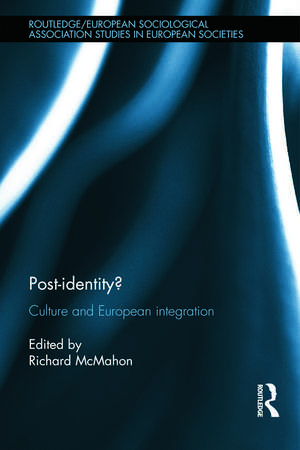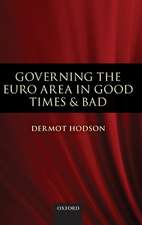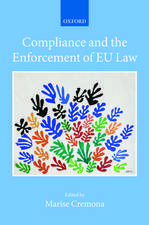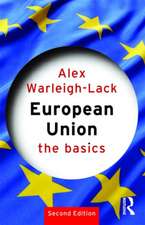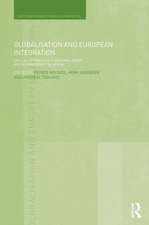Post-identity?: Culture and European Integration: Studies in European Sociology
Editat de Richard McMahonen Limba Engleză Hardback – 13 iun 2013
This controversial and timely volume poses the logical question: if identity doesn't effectively connect culture with European integration politics, what does? The book brings together leading scholars from several of the disciplines that have developed concepts of culture and methods of cultural research. These expert interdisciplinary contributors apply a startling diversity of approaches to culture, linking it to facets of integration as varied as external policy, the democratic deficit, economic dynamism and the geography of integration.
This book examines commonalities and connections within the European space, as well as representations of these in identity discourses. It will be useful for students and scholars of sociology, geography, anthropology, social psychology, political science and the history of European integration.
| Toate formatele și edițiile | Preț | Express |
|---|---|---|
| Paperback (1) | 389.66 lei 43-57 zile | |
| Taylor & Francis – 12 dec 2019 | 389.66 lei 43-57 zile | |
| Hardback (1) | 823.44 lei 43-57 zile | |
| Taylor & Francis – 13 iun 2013 | 823.44 lei 43-57 zile |
Din seria Studies in European Sociology
-
 Preț: 415.24 lei
Preț: 415.24 lei -
 Preț: 449.41 lei
Preț: 449.41 lei -
 Preț: 417.96 lei
Preț: 417.96 lei -
 Preț: 199.17 lei
Preț: 199.17 lei -
 Preț: 419.50 lei
Preț: 419.50 lei - 15%
 Preț: 423.28 lei
Preț: 423.28 lei - 49%
 Preț: 544.14 lei
Preț: 544.14 lei -
 Preț: 485.40 lei
Preț: 485.40 lei -
 Preț: 436.14 lei
Preț: 436.14 lei -
 Preț: 423.30 lei
Preț: 423.30 lei - 17%
 Preț: 258.09 lei
Preț: 258.09 lei -
 Preț: 389.66 lei
Preț: 389.66 lei -
 Preț: 271.40 lei
Preț: 271.40 lei -
 Preț: 410.25 lei
Preț: 410.25 lei -
 Preț: 449.41 lei
Preț: 449.41 lei - 14%
 Preț: 301.13 lei
Preț: 301.13 lei - 16%
 Preț: 261.54 lei
Preț: 261.54 lei -
 Preț: 389.60 lei
Preț: 389.60 lei - 18%
 Preț: 945.80 lei
Preț: 945.80 lei -
 Preț: 411.42 lei
Preț: 411.42 lei - 18%
 Preț: 700.75 lei
Preț: 700.75 lei -
 Preț: 413.33 lei
Preț: 413.33 lei - 25%
 Preț: 1304.72 lei
Preț: 1304.72 lei
Preț: 823.44 lei
Preț vechi: 1104.85 lei
-25% Nou
Puncte Express: 1235
Preț estimativ în valută:
157.57€ • 164.93$ • 131.14£
157.57€ • 164.93$ • 131.14£
Carte tipărită la comandă
Livrare economică 31 martie-14 aprilie
Preluare comenzi: 021 569.72.76
Specificații
ISBN-13: 9780415643764
ISBN-10: 0415643767
Pagini: 264
Ilustrații: 9 b/w images, 9 tables and 9 line drawings
Dimensiuni: 156 x 234 x 20 mm
Greutate: 0.65 kg
Ediția:New.
Editura: Taylor & Francis
Colecția Routledge
Seria Studies in European Sociology
Locul publicării:Oxford, United Kingdom
ISBN-10: 0415643767
Pagini: 264
Ilustrații: 9 b/w images, 9 tables and 9 line drawings
Dimensiuni: 156 x 234 x 20 mm
Greutate: 0.65 kg
Ediția:New.
Editura: Taylor & Francis
Colecția Routledge
Seria Studies in European Sociology
Locul publicării:Oxford, United Kingdom
Public țintă
Postgraduate and UndergraduateCuprins
Introduction. Part I: Europeans’ Weak Cultural Identity 1. Bringing the Demos Back In: People’s Views on ‘EUropean Identity’ 2. Enlargement in Perspective: The EU’s Quest for Identity Part II: Mistaken Identity: Critical Perspectives on European Culture 3. Not Quite "Sui Generis" Enough: Interrogating European Values 4. Putting Culture in its Place: Anthropological Reflections on the EU Part III: Culture, Ideology and a Politically Viable EU 5. What Kind of Community and How Much Community Does the European Union Require? 6. Cleaning Up After European Identity: The Consequences of a Failed Political Strategy 7. European Identity: Lessons from 20 Years of Social Psychological Inquiry Part IV: Cultural Alternatives to Identity 8. Lessons from the Past? Europe’s Grand Shift from Cultural Homogenization to Multiculturalism 9. Cultural Networks as Vectors of European Integration 10. Horizontal Europeanization and Identification with Europe 11. How Culture and History Shape Europe’s Differentiated Integration: The Cases of Liberal International Relations and Northern Euroscepticism. Conclusion.
Notă biografică
Richard McMahon lectures in history at University College Cork. He holds a PhD from the European University Institute, Florence and was previously a Brussels-based journalist of EU external relations and an ESRC research fellow in politics at the University of Bristol.
Descriere
Mechanisms of identity, borrowed from nationalism, have not worked well as cultural supports for European political integration. This controversial and timely volume therefore brings together leading scholars from several disciplines, each with distinct approaches to investigating culture. Contributors explore alternative links between culture and the politics of integration.
